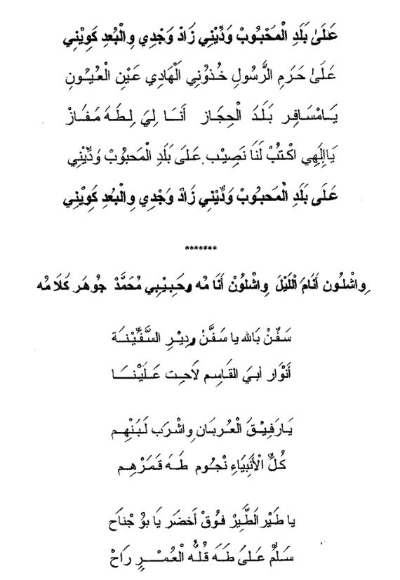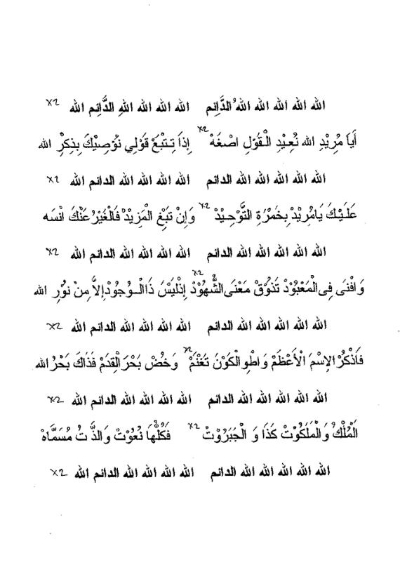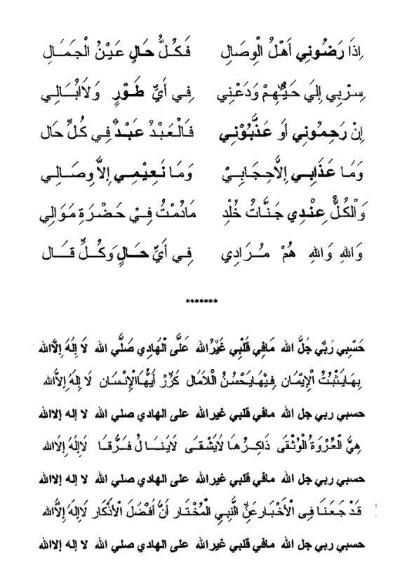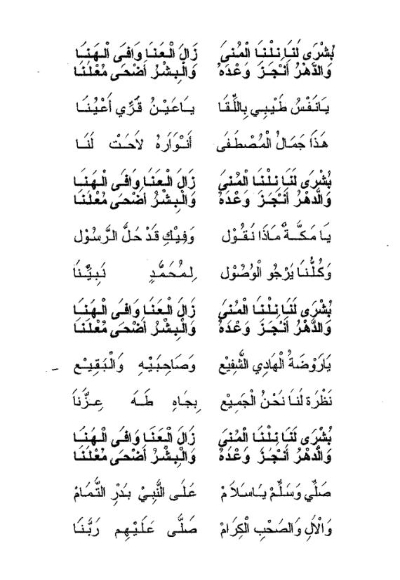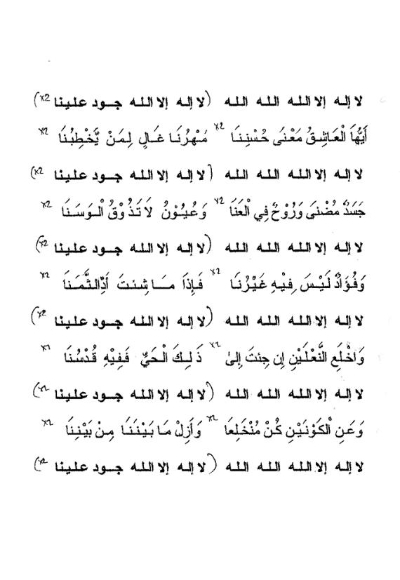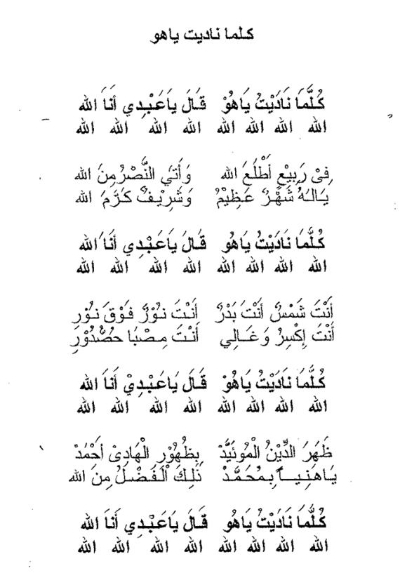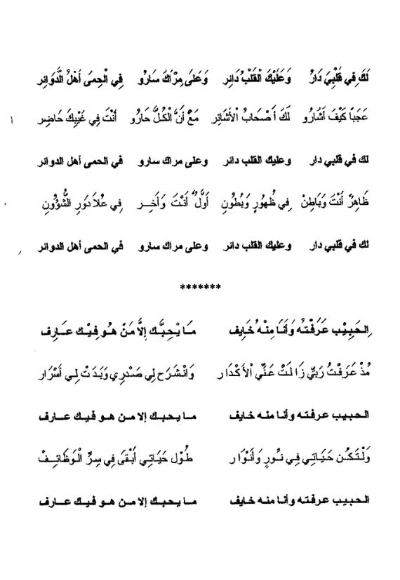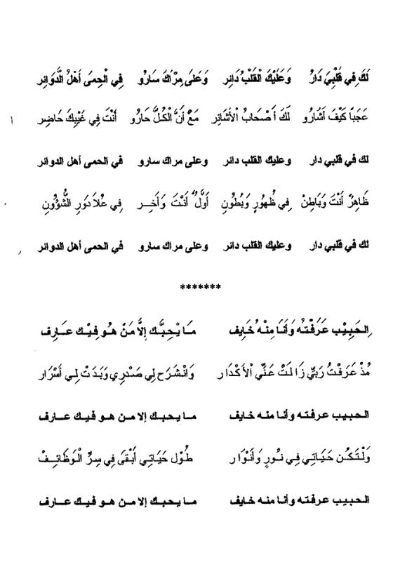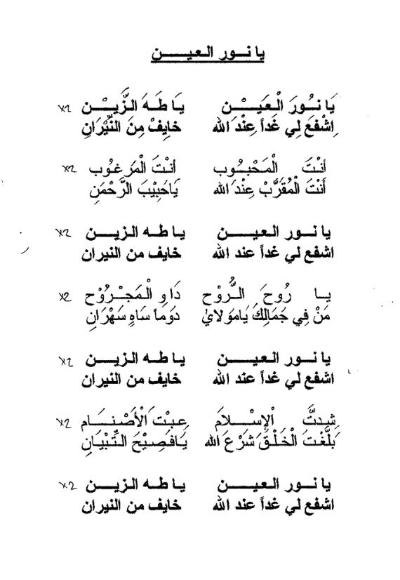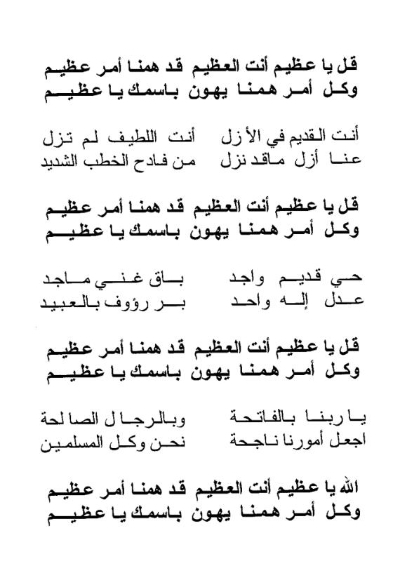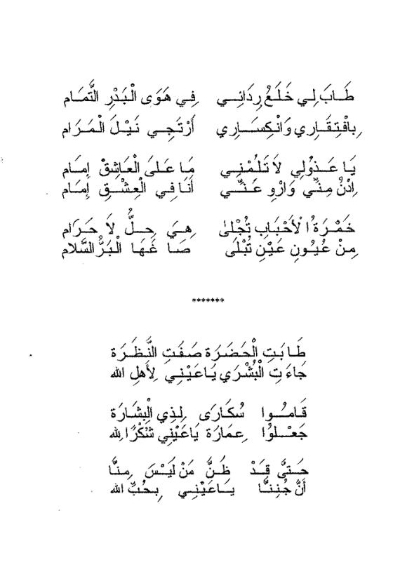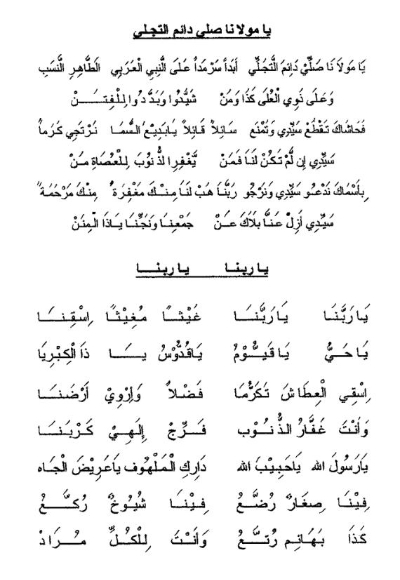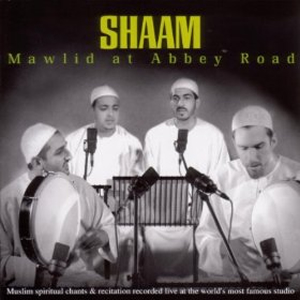 On a hot summer’s day in July 2004 SHAAM, resplendent in their white thobes stepped into the world’s most famous studio: EMI Abbey Road Studios, St. John’s Wood, London. Live in session in Studio 2, they performed four of their classical Arabic sets as they would at a Mawlid or gathering in remembrance and commemoration of God and His Last Prophet (SAW)…
On a hot summer’s day in July 2004 SHAAM, resplendent in their white thobes stepped into the world’s most famous studio: EMI Abbey Road Studios, St. John’s Wood, London. Live in session in Studio 2, they performed four of their classical Arabic sets as they would at a Mawlid or gathering in remembrance and commemoration of God and His Last Prophet (SAW)…
Introduction by Shaykh Abd’ al-Hakim Murad
The sacred tonalities of the Middle East were until very recently almost unknown in the West. Although in the last few years an intrepid group of artists and record companies have tried to remedy this spectacular inadequacy, but it is still fair to say that the Muslim music of the region is still far less familiar than, just to take two obvious examples, the equivalent Muslim sounds of Senegal or the Indian subcontinent.
This new SHAAM recording allows listeners a privileged insight into the rich and diverse world of Arab sacred song. Focussing on the music of Syria, which is also sung and appreciated over a wider Levantine region, it faithfully interprets some of the best-known sung poetry of traditional Islam in the Arab world. This is not the music of Iran, which carries with it much of the tragic atmosphere of Shi‘ism. Neither is it the virile, sophisticated modal music of the Turks, although historically Syria has been of all the Arab lands the most engaged with Turkish sacred culture. The distinctive major modes and anthem-like harmonies of the Andalusian tradition, still dominant in North Africa, are within earshot, but are nonetheless unmistakeably distinct. This is the sound of Syria.
A striking feature of this music is that it is sung a capella, with only a vigorous beat from the Arab drum, the daff, to contrast with the versatility of the voices. This immediately invites a comparison with Gregorian chant, whose richness has been rediscovered of late by many Western listeners. The resemblance seems strengthened by the almost complete absence of polyphony. In keeping with the almost universal tradition in Islamic music, the voices soar and descend on a single line, the unison receiving only occasional complexity from a deliberate inconsistency in the duration of some of the notes. But here the resemblance to plainchant ends abruptly. The sound of the monks is redolent of shadowy Gothic spaces, and, like the Gothic style which it inhabits, proposes a world of darkness to which the sacraments alone can bring light. There is a mysterious quality to Gregorian chant which is profoundly foreign to these Muslim Syrian sounds, with their insistent, often exuberant syncopations. The root of the difference is, in the last analysis, theological: Islam has no doctrine of original sin, and its arts and music do not emerge de profundis, but form part of the larger song of creation. ‘Have you not seen,’ says the Koran, ‘that God is hymned with praise by all who are in the heavens and the earth, and the birds in their flight? Each knows its prayer and its form of praise.’ The Muslim believer is invited not to set creation behind him, but to join it, and therefore to experience something of its beauty and joy. ‘I rejoice in the world,’ says one Muslim poet, ‘because the world rejoices in Him.’
The words of the songs reflect this optimism. Islam has its austere dimension, recognising as it does the frequent difficulty of human life. Some of these songs, therefore, contain a strong dimension of self-reproach, and a plaintive appeal to God for the gift of repentance. Others – the majority – are paeans of thanksgiving for the blessings of Heaven. These include the beauties of nature, seen as signs by which we may know God; but the leading theme is the supreme gift of faith, and the one who brought it in its Muslim form, the Blessed Prophet Muhammad (570-632). Muslim song tends to be Prophetic song: its greatest achievement, the Mantle Ode (Qasidat al-Burda) of the thirteenth-century Egyptian sage al-Busiri, commemorates the divine blessing that the Prophet represents. Many of the best-loved themes of that poem are echoed in the songs of this collection, which celebrate the Blessed Prophet as ‘mercy to the worlds,’, as the ‘beautiful Taha’ (taha al-zayn), the ‘light of our eyes’ (nur al-‘ayn), the exemplar of all virtues, the bearer of God’s word, and the one whose intercession with God will be sought by all believers on the Judgement Day. Islam, as we have seen, has no doctrine of original sin, but its consciousness of human sinfulness is nonetheless acute, and the orthodox doctrine of the Blessed Prophet as intercessor with God has comforted many a troubled and penitent soul since the earliest days of the religion. For Muslims, the Blessed Prophet’s gifts in this world have been immeasurable, and he remains in communication with the true believers by appearing to them in dreams and giving instruction; but to many it has seemed that his supreme gift, the highest expression of his status as ‘mercy to the worlds’ will be his Intercession (shafa‘a), when he pleads at the judgement-seat for the salvation of sinners.
An initiation into this collection of timeless Muslim masterpieces is therefore an initiation into the inner world of Islam, a culture of joy and forgiveness which for many in the West has been veiled by the actions of an extremist fringe. Music can help to heal this perception: it is a universal, generous language that is always hospitable and sincere. By entering the sacred space which these sounds establish, people of all faith traditions can experience something of the peace and joy which prevails in the mosques and homes where these sounds have been heard for hundreds of years.
TJ Winter
Cambridge, England
November 2004
Select Verses from the Holy Qur’an
Allah and His Angels send blessings on the Prophet: O ye that believe! Send ye blessings on him, and salute him with all respect.
The Holy Qur’an – Surah Al Ahzab [The Confederates] Verse 56
For without doubt in the remembrance of Allah do hearts find satisfaction.
The Holy Qur’an – Surah Al Ra’d [The Thunder] Verse 28
Say: “In the Bounty of Allah. And in His Mercy – in that let them rejoice”: that is better than the (wealth) they hoard.
The Holy Qur’an – Surah Yunus [Jonah] Verse 58
And thou (standest) on an exalted standard of character.
The Holy Qur’an – Surah Al Qalam [The Pen] Verse 4
We sent thee not, but as a mercy for all creatures.
The Holy Qur’an – Surah Al Anbiya [The Prophets] Verse 107
Say: “If ye do love Allah, follow me: Allah will love you and forgive you your sins; for Allah is Oft-Forgiving, Most Merciful.”
The Holy Qur’an – Surah Ali Imran [The Family of Imran] Verse 31
Album Credits
The copyright in this sound recording and artwork is owned by Meem Ltd.
(C) 2004 Meem Ltd.
(P) 2004 Meem Ltd.
Recorded on Sunday 4 July 2004 live at EMI Abbey Road Studios (Studio 2), London, UK
Edited at Hush Studios, Coventry, UK
Mastered at Reflex Media, Huntingdon, UK
All tracks traditional. Material derived from: Shaykh Al ‘Alawi; Shaykh Muhyideen Ibn ‘Arabi; Shaykh Umar Al Yafee; Shaykh Mustafa Alhamu Al Margee; Shaykh Abdul Qadir Al Humsee; Shaykh Wafa Al Halbee Al Rifa’i; Shaykh ‘Ali Wafaa; Shaykh Mustafa Jafrey; Ahmed Muzarze; Yusuf Muzarze; Shaykh Abd Al Hadi Al Kharsa; Noor Uddin Khursheed and Khalid Mujjabir.
Executive Producer: Tayyeb Shah
Producer: Haroon Bashir
Composition & Arrangement: Traditional, Haroon Bashir, Mahmood Norris, Yasin Alam, Imran Bashir
Studio Engineer: Alex Scannell
Assistant Engineer: Miroslav
Editing: Darren Wood
Mastering: Andy Bennett
Photography: Muhsin Kilby & Atif Saghir
Cameraman: Ken Clay
Sound Recordist: Les Derby
Artwork: Ozgurarcan
Qur’an English translation taken from ‘Abdullah Yusuf Ali’s ‘The Holy Qur’an: Text, Translation and Commentary’
Track Listing
Opening the Mawlid
1. Adhan – Call to Prayer
2. The Holy Qur’an – Surah Ahzab Verse 56
3. Salawat Kamaliya – Great Salutations
4. Bushra Lana – Glad Tidings
Set One
5. Du’a – Supplication
6. Laka Fi Qalbi – In My Heart
7. Il Habib ‘Araftu – To Know Allah
8. Ya Ilahi – O My Creator
9. Allahu Da’im – Allah The Everlasting
10. Qul Ya Adheem – Say He is The Greatest
11. Al Humdu Lilah – Thanks Be To Allah
Set Two
12. Jood Alaina – Be Generous To Us
13. Ya Noor Al ‘Ain – O Light Of Our Eyes
14. Ala Baladil Mahboob – To Visit The Land Of The Beloved
15. Wishloon Anam Al Layl – About The Night Of Ascension
16. Ya Noor Al Quloobi – O Light Of My Heart
Set Three
17. Ya Molana Sali – O Lord Send Salutations Upon Muhammad
18. Ya Rabbana – O Sustainer
19. Iza Radoony – To Gain The Love Of Pious People
20. Hasbi Rabbi Jal-Allah – Enough For Me Is My Lord
Set Four
21. Qur’an – Surah Ra’d Verse 28
22. Tabaly – Be Sweet To Me And Kind
23. Tabat il Hadarah – The Gathering
24. Talama Ashku Gharami – Expression To See Muhammad (SAW)
25. Ya Rijal Allah – O Men Of Allah
26. Kulama Na Dayta – Every time I Call
Closing the Mawlid
27. Haythu Gibrael – Gabriel’s Wings
28. Salawat Ibrahimia – Salutations Upon Abraham
29. The Holy Qur’an – Surah Al Kafiroon / Those Who Reject Faith
30. The Holy Qur’an – Surah Al Ikhlas / The Purity of Faith
31. The Holy Qur’an – Surah Al Falaq / The Daybreak
32. The Holy Qur’an – Surah Al Nas / Mankind
33. The Holy Qur’an – Surah Al Fatiha / The Opening
Album Acknowledgements
All praise is due to the Lord of the Worlds, the most Gracious and Beneficent for blessing us with faith and health. Salutations upon all the Prophets and upon the seal of Prophets, Muhammad, in whose name we make the Mawlid (Peace & Blessings of Allah be upon them all).
We owe a great debt to all the pious people and teachers in Syria and Yemen we know – plus those who are not known to us nor listed – for writing the beautiful material that inspires us to sing; also to Ahmed & Yusuf Muzarze for setting an example.
We would like to thank our parents and families for their continued support and patience over the last 10 years; Tayyeb Shah for his dedication and friendship; Shaykh Abdul Hakim Murad: thank you for the beautiful words that put things into perspective; Shaykh Habib Ali Al-Jifry for being a source of inspiration and motivation; Shaykh Hamza Yusuf; Imam Zaid Shakir; Shaykh Abdul Hadi Al Kharsa; Haji Sadiq; Shaykh Abu Nur Qabbani; Zeshan Zafar; Aftab Malik; Muhsin Kilby (photography); Atif Saghir for all your support humour and brilliant photography; Ken Clay (filming); Saeed Mahmood; Naseer Khan and Abdur Rahman Rassam (Al Haba’ib) for making the day much more enjoyable; Darren Wood (Daz) for all the years of patience and understanding of our music; Dr Sultan & Nur Norris for translating and working out lyrics; Mustafa Evans; Sajaad; Adil and Saima – thank you for your advice guys; and Sabina Jabeen Bashir for valuable feedback.
Last but no means least our sincere thanks to all our fans and well-wishers around the world. May Allah Most High reward you all.
Arabic Lyrics

